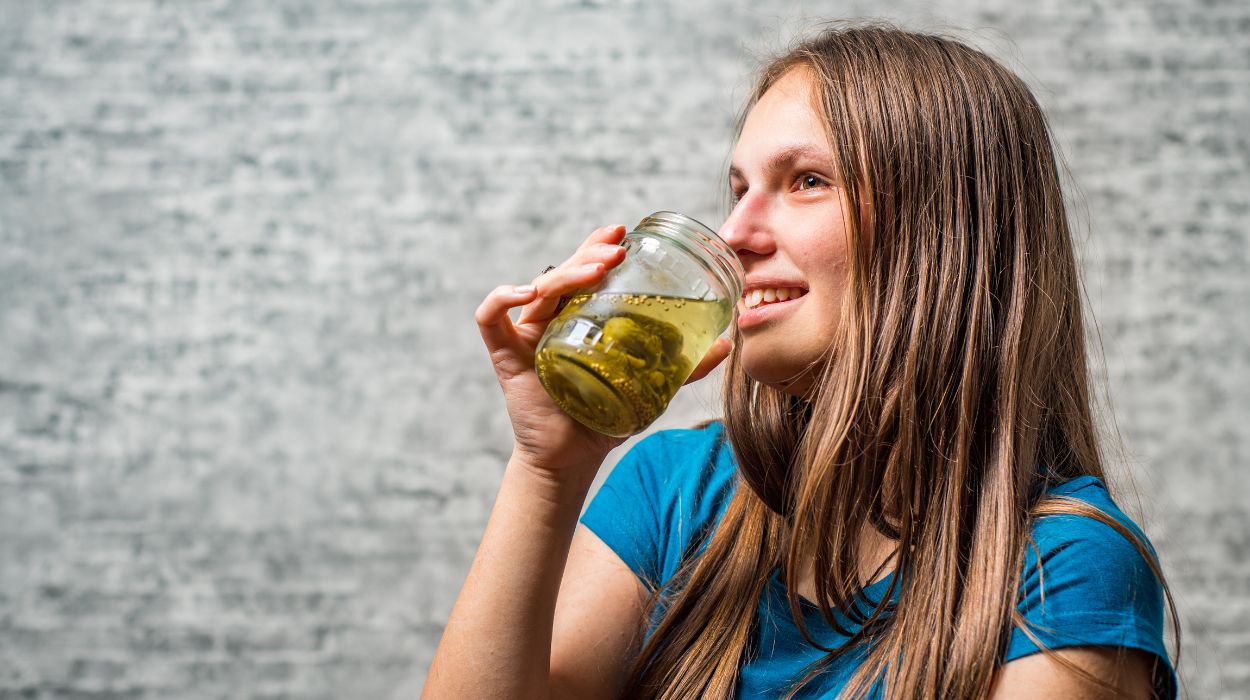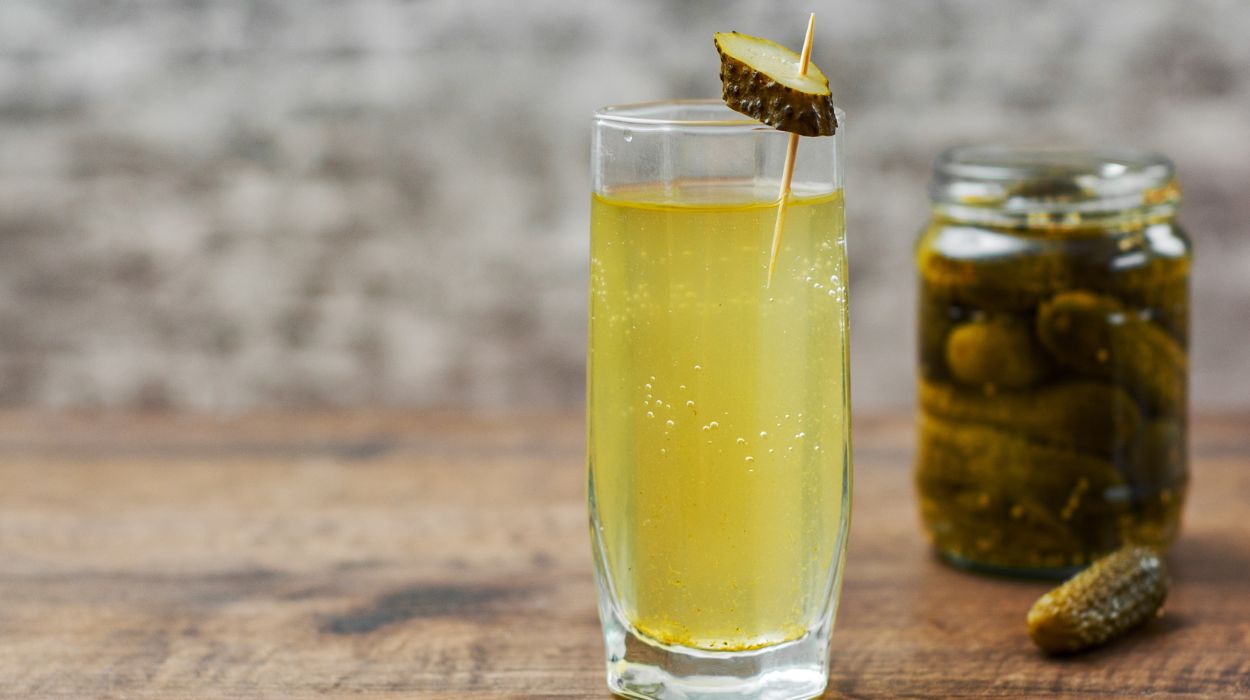Pickle juice may sound like an odd beverage, but it contains many nutrients that can promote health and weight loss. While there’s no exact amount of pickle juice to drink to lose weight, consuming small amounts of pickle juice can nevertheless help curb appetite, stabilize blood sugar, and improve gut health, all of which can encourage a healthy weight.
This article explains the benefits of drinking pickle juice and offers suggestions for consuming it. In addition, this article covers the possible side effects of pickle juice, precautions for drinking it daily, and other considerations for losing weight in a healthy and sustainable way.
Can Drinking Pickle Juice Help With Weight Loss?
Yes. Pickle juice contains probiotics, vinegar, and electrolytes. All of these components may support weight loss.
How Much Pickle Juice To Drink To Lose Weight?

If you want to know, “How much pickle juice should I drink to lose weight?”, there is no straightforward answer.
No established guidelines exist for the amount of pickle juice that is necessary for weight loss. Drinking small amounts of pickle juice every day may help you lose weight. Consuming excess amounts may be harmful and will not speed up or induce more weight loss.
Speak with a doctor or nutritionist to establish daily amounts of pickle juice for your weight loss goals.
Is Pickle Juice Good for You?
Pickle juice can be good for you. Pickle juice is the brine or liquid in pickle jars. It is made with vinegar, water, and salt. It contains various vitamins, minerals, and electrolytes.[1] Electrolytes offer hydration and vinegar provides blood sugar stability.[2] The vinegar in pickle juice is fermented and may contain probiotics[3] which can enhance gut health.
However, due to the salt in the brine, pickle juice is high in sodium. Typically, people only need small amounts[4] of sodium for optimal health and weight.
The recommended amount of sodium is less than 2,300 mg per day, but most Americans consume 3,400 mg per day. Consuming too much sodium can lead to health consequences and may cause water weight.
Benefits Of Pickle Juice

Aside from recipe variations, most pickle juices contain vinegar, electrolytes, and probiotics. These nutrients within pickle juice contain many health benefits.
Blood Sugar Stability
Studies show vinegar can lower[5] blood sugar spikes after eating carbohydrates by stimulating insulin production, leading to steadier glucose levels. Vinegar may have particularly positive effects on glucose for individuals with type 2 diabetes.[6]
Because vinegar can reduce blood sugar spikes, it may be particularly helpful to consume a small amount just before eating a carbohydrate-heavy meal.
Satiety
In short-term studies, vinegar has been shown to suppress appetite.[7] Including vinegar and vinegar-based beverages in your diet, such as pickle juice, may increase satiety.[8] This can help curb cravings and reduce overeating.
Hydration And Muscle Relief
Pickle juice has both sodium and potassium,[9] essential minerals that provide electrolytes.[10] Electrolytes are needed to balance fluid in your body as well as blood acidity. Electrolytes are also needed for optimal cell and muscle function.
Dehydration[11] can lead to various symptoms, including muscle cramps. Research[12] indicates that lost electrolytes lead to muscle cramps. Electrolytes are important for muscles and hydration, especially for those exercising regularly.
Probiotics
While most commercial brands of pickles are pasteurized, some pickles are fermented. Fermented foods[13] develop healthy bacteria during the fermentation process. The healthy bacteria, also called probiotics, have numerous health benefits.[14]
By feeding the beneficial bacteria in the gut, probiotics can decrease inflammation, improve cholesterol, lower blood pressure, enhance immunity, and improve gut health. Consider fermenting your own pickles to ensure they contain these health-promoting probiotics.
Seasoning
Depending on the brand of pickles, pickle juice may contain some additional benefits from seasoning. Some brands are seasoned with garlic[15] and mustard seed,[16] while others are packed in jars with dill,[17] coriander,[18] or turmeric.[19] Spices add not only robust flavors to the pickle juice but may add various health properties as well.
Side Effects of Drinking Pickle Juice
Pickle juice is typically made of a mixture of vinegar and water, although in some cases, it may be undiluted vinegar. The acidity in vinegar may cause tooth erosion.[20] Additionally, vinegar may aggravate peptic ulcers.[21] People with ulcers should avoid pickle juice.
Pickle juice and pickles, themselves, may also elevate blood pressure[22] due to the high salt content. Those at risk for high blood pressure should avoid pickle juice.
Pickle juice may also cause temporary gastrointestinal discomfort. If the pickles are fermented, the bacteria[23] may lead to gas, bloating, and changes in bowel habits.
Pickle juice may not be right for everyone. If you want to try other natural support for weight loss, ask your doctor about taking a natural fat burner, diet pills, or other weight loss supplements.
How To Drink Pickle Juice To Lose Weight
There is no established amount or frequency for drinking pickle juice for weight loss. However, you can follow some best practices to reap the most benefits of pickle juice. Include these tips along with a healthy diet and exercise.
Choose Vinegar-Based
Choose a vinegar-based pickle juice, as opposed to a water-based one. Vinegar may help stabilize[24] blood sugar and suppress appetite.[25] However, when consuming pickle juice, use a straw to avoid contact with your teeth as too much vinegar can damage them.
Drink Small Amounts
Too much pickle juice can raise blood pressure[22] and upset your stomach.[21] Having only small amounts is enough to get the hydrating, gut-boosting, and blood sugar-stabilizing effects. Consult your doctor or nutritionist for specific dosages.
Drink Before A Meal
The vinegar in the pickle juice can help reduce glucose spikes from the meal. Therefore, it’s believed that consuming pickle juice before a carbohydrate-heavy meal can be beneficial. However, pickle juice can generally be consumed at any time in moderation.
Conclusion
Consuming pickle juice, along with a healthy diet and lifestyle, can help you lose weight over time.
Pickle juice is the brine or liquid that pickles are stored in. It contains water or vinegar, or sometimes both. It also contains salt and may contain other seasonings, as well.
Pickle juice may support health and weight loss because of the vinegar, minerals, electrolytes, and probiotics in the brine. Together, these elements can hydrate the body, enhance beneficial gut bacteria, stabilize blood sugar, and curb appetite.
Frequently Asked Questions
There is no ideal time to drink pickle juice for weight loss. However, drinking small amounts of pickle juice just before a carbohydrate-heavy meal may help reduce blood sugar spikes from carbohydrates.
The timing of its effects on weight loss is not established. As a means to restore hydration and relieve muscle cramps, the electrolytes in pickle juice may take effect quickly after consumption.
It’s likely okay. Most people can safely drink small amounts of pickle juice every day. However, if you are at risk for high blood pressure or have ulcers, you should consult a doctor before drinking pickle juice.
This depends on your stomach health. If you have certain conditions such as stomach ulcers or acid reflux, you may want to talk with a doctor as your stomach may be too sensitive towards acidic fluids such as pickle juice to drink on an empty stomach.
You may be able to gain similar benefits of pickle juice by eating pickles instead. Pickles absorb many of the nutrients in pickle juice. However, pickle juice may have higher concentrations of minerals and vinegar.
Yes. You can choose the cucumbers and use any ingredients you choose. For example, with pickles brined in vinegar, you can choose white or apple cider vinegar and add whatever spices you like.
 Expert's opinion
Expert's opinion
